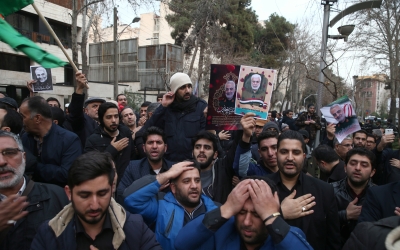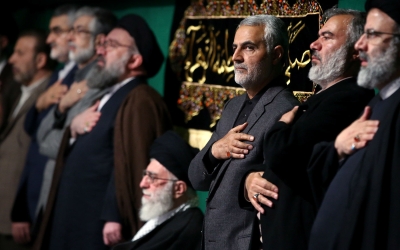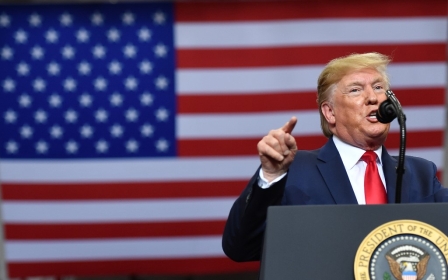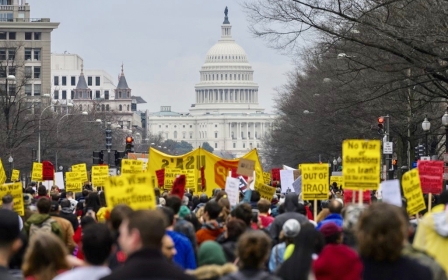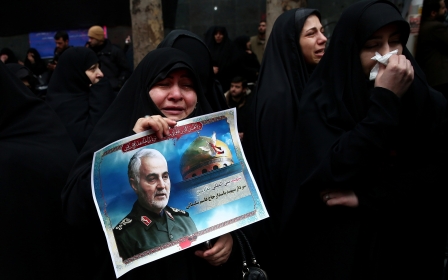Qassem Soleimani: Guardian of Iran's regional interests
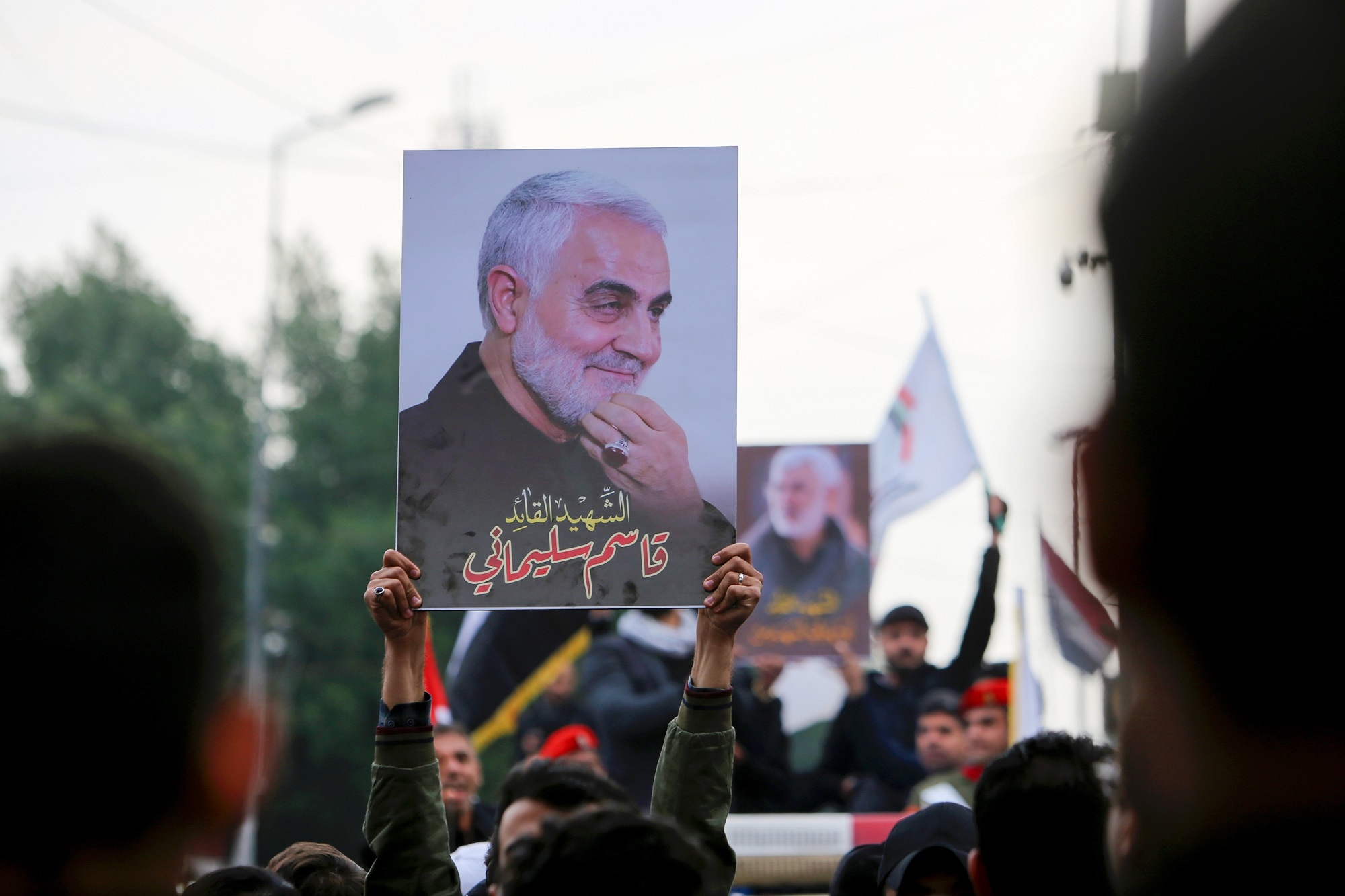
Famously described by ex-CIA officer John Maguire as "the single most powerful operative in the Middle East", Qassem Soleimani came from humble beginnings.
US drone strikes killed the commander of Iran’s Quds Force in Baghdad in the early hours of Friday. His targeted convoy was also carrying a number of senior Iraqi Popular Mobilisation Units (PMU) leaders.
The deputy head of the PMU, Abu Mahdi al-Muhandis, also died in the attack.
Muhandis had been a close companion of Soleimani since the Iran-Iraq War in the 1980s.
Soleimani was born to a rural working-class family on 11 March 1957 in the Rabor district of the southeastern Iranian province of Kerman.
He was still in his early 20s when he joined the newly founded Islamic Revolutionary Guards Corps (IRGC), following Iran's 1979 Islamic revolution. There, he served as a key battlefield commander during the eight-year war with Saddam Hussein's Iraq.
In that capacity, he put together a battalion of fighters from Kerman province that later expanded into a brigade before becoming an active military division known as the "41st Sarallah Division".
Soleimani remained its top commander until 1997, when he was appointed by then IRGC commander-in-chief Yahya Rahim Safavi to lead the Quds Force, an elite branch of the Revolutionary Guards formed in the early 1980s, and tasked with overseas operations in the Middle East and beyond.
"The Quds Force was quite unknown and obscure - at least among Iranians - until the US invasion of Iraq in 2003, which compelled Iran to intervene for strategic reasons as well, providing an opportunity for Soleimani to exhibit his asymmetric war leadership capabilities," an IRGC-affiliated intelligence analyst based in Tehran told Middle East Eye on condition of anonymity.
Rise to power
With a vested strategic interest in Iraq and a perceived need to disrupt Washington's plans there, Tehran gradually shifted the mantle and authority from trained diplomats and civil servants to battle-hardened military commanders.
Soleimani was the Islamic Republic’s prime pick for the job.
That was his moment in the Iranian corridors of power and, by extension, in regional politics.
Earlier, his name had grabbed public attention as a signatory of a notorious letter written by 24 IRGC commanders to former reformist President Mohammad Khatami after the 1999 student protests in Tehran.
The letter chastised Khatami's administration for sympathising with anti-establishment protesters, warning that "we are running out of patience".
General Esmail Ghaani, Soleimani's deputy since 2007 and now newly-appointed head of the Quds Force, also signed on to the scathing document.
In March 2019, Soleimani became the first general in the 40-year history of the Islamic Republic to be awarded the "Order of Zolfaghar", an honour named after the sword of Imam Ali, one of the most revered figures in Shia Islam.
Supreme Leader Ayatollah Ali Khamenei, who labelled "Haj Qassem" a "living martyr" and "Islam's precious treasure", presented the medal to the slain general.
Despite the delicate nature of his mission, Soleimani was not entirely secretive about his status and powers. Unlike Hezbollah's Imad Mughniyeh, who operated in the shadows, the Iranian general made his presence known.
He even recently taunted American officials on social media.
In 2008, he directly addressed the commander of US-led coalition forces in Iraq, David Petraeus.
"Dear General Petraeus, you should know that I, Qassem Suleimani, control the policy for Iran with respect to Iraq, Lebanon, Gaza and Afghanistan," he wrote in a text message conveyed by then-Iraqi President Jalal Talabani.
"And indeed, the ambassador in Baghdad is a Quds Force member. The individual who's going to replace him is a Quds Force member [as well]," Soleimani added in the message to Petraeus, who later described the Iranian general as a "truly evil" strategist.
Far reach
Soleimani’s Quds Force and its Afghan paramilitary partners, the Northern Alliance, an anti-Taliban militia front founded by former Afghan defence minister Ahmad Shah Massoud, were critical to the success of the US-led invasion in October 2001. Notably, Massoud was assassinated in the northeastern province of Takhar two days before the 11 September terrorist attacks.
"I have special respect for General Soleimani," Iranian Foreign Minister Mohammad Javad Zarif once noted. "It is over 20 years that we have been closely collaborating to advance the objectives of the Islamic Republic in finding political and peaceful solutions."
In parallel to making sure that neighbouring Iraq remains within Tehran’s geopolitical orbit, Solaimani also played a major role in propping up the embattled government of Syrian leader Bashar al-Assad.
Despite the widespread reports of human rights abuses and war crimes by the Syrian government, from Tehran's perspective, the Soleimani-led intervention in Syria aimed to tackle the threat of militant groups including the Islamic State group and al-Qaeda.
Soleimani even personally met Russian President Vladimir Putin "for 2 hours and 20 minutes" to convince him to take military action in Syria on behalf of the Assad government, according to General Mohammad Jafar Assadi, a top IRGC commander.
The Russian intervention in the Syrian civil war in September 2015 decisively changed the tide of war in favour of Damascus.
The bloody campaign to ensure Assad's survival at any cost, which took hundreds of thousands of innocent lives and lacerated the fabric of the Syrian nation, cost Soleimani dearly in the court of regional public opinion.
As the news of Soleimani’s assassination spread, groups of people in Iraq and the rebel-held Idlib province in Syria took to the streets to celebrate his demise.
Some Iranians have similarly been rejoicing at the event, angry with his purportedly behind-the-scenes role in the Revolutionary Guards' brutal repression of anti-government protesters at home.
Still, by the time of his death, he was revered as a valiant commander and national hero among many Iranians of various stripes, including irreligious nationalists and Shia Muslims worldwide.
Thanks in particular to leading a successful fight against the Islamic State group in Iraq and Syria and on the back of considerable state propaganda, Soleimani came under the spotlight and acquired a celebrity status at home and abroad.
And that, ultimately, proved to be his undoing.
Middle East Eye propose une couverture et une analyse indépendantes et incomparables du Moyen-Orient, de l’Afrique du Nord et d’autres régions du monde. Pour en savoir plus sur la reprise de ce contenu et les frais qui s’appliquent, veuillez remplir ce formulaire [en anglais]. Pour en savoir plus sur MEE, cliquez ici [en anglais].



